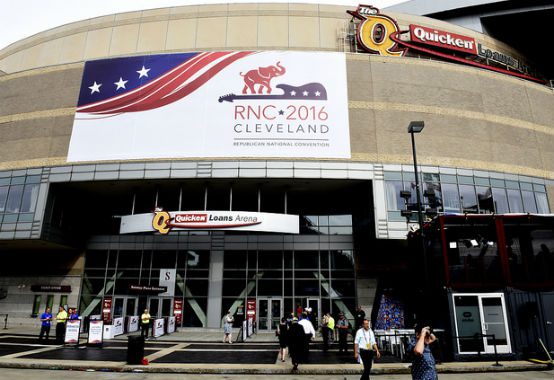A Convention Like Every Other?

CLEVELAND—On Monday afternoon, dozens of people were on TV proclaiming that this convention is unlike any other they’ve ever seen. It’s partially true, even as at every convention it seems a bit bizarre to see delegates, for the most part grown-up and conventional middle-aged people in real life, roaming about in large groups, wearing matching costumes—cowboy hats and colorful vests in the case of the huge Texas delegation.
The most salient thing about Cleveland is the police presence. A large section of downtown Cleveland near the “Q” arena is blocked off to automobiles, with the kind of truck stopping barriers that now proliferate on Capitol Hill. Cage-like lanes have been put in place to provide channels for permitted vehicles. It’s a vast infrastructure of barriers that must have taken weeks to plan and construct. There was of course nothing like this in the conventions I’ve attended before, both in New York.
On the streets outside you see groups of, for instance, California Highway Patrol officers, on loan from the Golden State, walking about in groups of four or six. They are fish out of water, but the delegates and locals both welcome them ostentatiously and warmly. There are TVs everywhere, in every bar near the venue, and large screens jut out from the restaurants. And the headlines are of course unavoidable—cops being murdered in Baton Rouge, one day after the last of the funerals for the cops murdered in Dallas, and all in the aftermath of the horror in Nice, France. One is hard put to even imagine a single person who thinks there is too much security.
As of yet, there doesn’t seem need for it; thus far the anti-Trump agitation has been from the right, inside the convention hall. Establishment Republicans well represented in the states which held caucuses and not primaries mounted their own last gasp of the Never Trump movement, and got ample media play for the idea that the delegates be allowed to “vote their consciences” and ignore the wishes of voters who elected them. This bid was thwarted by the chair of the convention, but the GOP establishment “rebels” got air time.
But of course no one knows how great the threat of violent left-wing disruption in the streets will be—what form it will take, and whether the cops can handle it. The physical attacks on Trump supporters by leftists in the streets of Chicago and San Jose and other places were without recent precedent in American politics, though that’s not what media talking heads mean when they go on about how unusual Cleveland is.
It’s not clear how far Trump’s choice of Mike Pence will go to mitigate the hostility. Pence is a balance on the ticket, a social conservative in contrast to Trump’s “New York values,” a mouther of neoconservative foreign policy bromides while a member of Congress, the type of Republican respected by party insiders. Trump almost certainly needed to reach out to the heart of the party, whose main establishment figures he had summarily vanquished.
The social conservatism of course Trump can live with easily: He reached out to Evangelicals comfortably during the primaries, and his turnabout on abortion sounded sincere to many pro-life people. To what extent, and with how much fervor, does Pence still embrace the neoconservatism of Bush and Cheney in foreign policy? It’s an unknown of course; one would hope that Pence went along with the hawkish GOP mainstream out of a political sense that thwarting it would be political death. Only one of the seven GOP members of Congress who voted against the war in 2002 are still in electoral politics. Of course one could conclude pessimistically that Trump has brought on board a knowledgeable political insider who will steer a Trump administration away from Trumpism, especially on the foreign policy issues that made Trump the least hawkish candidate (along with Bernie Sanders) running for president.
Watching the Monday speeches, the convention seemed normalized. They are always like this. The unexpectedly good were some of the relatively unknown who were victims of the Obama era. Giuliani, who save for an unfortunately ignorant detour about the Iran deal, was amazing: smart and tough, and rousing the convention as no one else has and, perhaps, some of the country. Then Melania Trump was pretty and charming. I actually have heard someone (a smart, hardworking, top-level manager) tell me, “I may be shallow, but I’d rather look at Melania for the next four years than Bill and Hillary.”
After day one, it’s clear that the convention is so far quite a success: not too bizarre (B-list celebrities are usually better speakers than B-list politicians); Giuliani still a star and historic figure; Melania, a bit odd to have her speaking, but she is attractive and appealing. And the establishment GOP rebellion against Trump seems to have been quelled. To hear Melania in her Zsa Zsa Gabor voice say “We must all come together in a campaign like no other”—well, it’s not bad, not bad at all.
Scott McConnell, a founding editor of The American Conservative, reports this week from Cleveland.
Comments